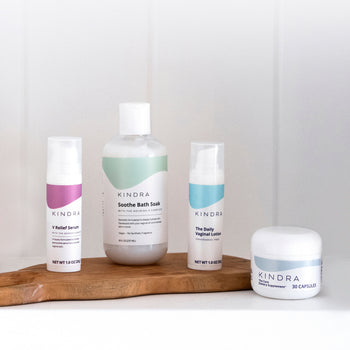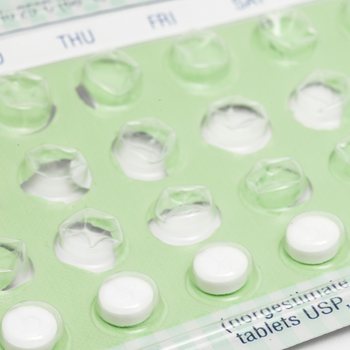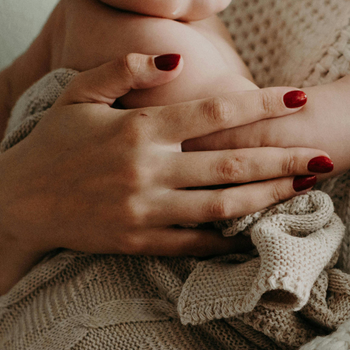We know that vaginal dryness is one of the most common symptoms of menopause, but that doesn’t make it any less of a pain in the, *ahem*, vag. It’s uncomfortable, disruptive, and downright annoying. Plus, the irony isn’t lost on us that the instant you stop having to worry about pregnancy, that’s when sex gets painful and frustrating.
But silver linings time: There is a plethora of prescription medicines, at-home remedies, and alternative medicine practices to make things a little more comfortable down there. Below, we’ve rounded up some need-to-know info on the causes of vaginal dryness, and your many, many options for reinvigorating your vagina.
What Causes Vaginal Dryness During Menopause?
Vaginal dryness (also known as “atrophic vaginitis” or “vaginal atrophy”) affects an estimated 50 percent of postmenopausal women, according to Harvard Health. The actual number might be even higher — a whopping 76 percent of women who take the Kindra Menopause Symptoms quiz deal with vaginal dryness. (Vaginal dryness can happen to pre-menopausal folks, too, during periods of low estrogen like childbirth, breastfeeding, or cancer treatment.)
If you want to know why vaginal dryness happens… well, blame your hormones. The sex hormone estrogen does a lot in your body, including helping to lubricate your vaginal tissues and keeping them strong and flexible. This makes penetrative sex more comfortable (and, you know, fun). But as your estrogen levels decline during perimenopause — and drop off to consistently low levels once you hit menopause — your vaginal tissues shrink, thin, and become dry and inflamed.
Apart from, well, dryness, atrophic vaginitis can also lead to a host of other uncomfortable issues including painful sex, burning or itching in your vagina, a yellowish discharge from the vagina, spotting or bleeding, a feeling of pressure, or itchy vulvas. (Your vulva, BTW, is the area around and outside of your vagina. Your actual vagina is entirely on the inside!) Some people might also start to pee more often, have pain when they pee, or even start to get more urinary tract infections (UTIs).
Vaginal dryness is easily one of the most frustrating and isolating symptoms of menopause. It can make sexual intimacy challenging, cause daily pain and discomfort, and make you feel disconnected from your body. All of this can exacerbate the other stresses and mood changes associated with menopause, but take heart in knowing that you’re not alone. Remember: A lot of women go through this. And thankfully, there are plenty of ways to mitigate at least some of the discomfort.
How to Deal With Vaginal Dryness at Home
Unlike a lot of other menopause issues, there thankfully is a decent amount of research on vaginal dryness and how to treat it. That means there’s a lot of different options for you to try in the comfort of your own home to help feel better. However, it’s always worth chatting with your doctor about what treatment options are right for you. Depending on your symptoms, they may recommend one, or a few, of the following at-home treatments.
- Vaginal and vulvar lotions: Just like you’d treat dry skin on your face with moisturizer, you can hydrate your nether regions the same way with specially-formulated lotions. They’re typically designed to help the vaginal area better retain moisture, and are either inserted inside the vagina or applied to the vulvar tissue outside the vagina. Kindra’s Daily Vaginal Lotion uses hydrating glycerin plus anti-inflammatory niacinamide to help soothe and moisturize the area.
- Vaginal serums: Our new V Relief Serum is specially-formulated for extra dry, sensitive tissues thanks to hydrating hyaluronic and sensitivity-busting peptides. (Never use face or body lotion on your vagina or vulva — it might irritate skin or disrupt vaginal pH.)
- Vaginal lubricants: Lube is always a good idea in the bedroom, but if you’re experiencing painful sex due to vaginal dryness, it’s a real game-changer. Apply it just before sex and during, when needed. The National Institute on Aging recommends a water-based lubricant over oil- or silicone-based products to avoid irritation (and ensure compatibility with condoms).
- Have sex: It seems counterintuitive, but getting it on helps stimulate blood flow to the tissues, which may help relieve vaginal dryness. (Masturbation counts, too!) Don’t forget the lube, and take it slow.
- Avoid perfumed soaps and washes: Perfumed soaps and washes can further irritate and dry out your genital skin, so opt for unscented personal care products like our Soothe Bath Soak, if you can. If you have any questions about what products do and don’t belong in your routine in this current life chapter, make sure to link up with your health practitioner.
When to See a Doctor About Vaginal Dryness
There are a few dead giveaways that it’s time to consult your doctor instead of taking this one on by yourself:
- Your vaginal dryness persists despite your at-home remedies.
- You’re experiencing bleeding from your vagina or unusual vaginal discharge.
- Your vaginal dryness is interrupting your life.
- You have been bleeding during sex or in between your period (if you still get periods).
When you sync up with your healthcare provider, they may prescribe you creams, patches, gels, or other medicines to address the symptoms of vaginal dryness or its underlying causes.
Vaginal estrogen treatments are some of the most common treatments doctors prescribe for vaginal dryness. These products, which can come in the form of creams, rings, tablets, or suppositories, contain very small amounts of estrogen and help reintroduce the hormone directly to the areas that need it. Only a low dose of estrogen is used (much less than traditional hormone replacement therapies), and very little of it is absorbed in the bloodstream, meaning there is less risk of estrogen-related side effects like blood clots than HRT or even birth control pills.
That said, not everyone can or wants to take hormones (say, people who have a history of breast cancer). Thankfully, there are still a few alternatives that can help with vaginal dryness, sans estrogen:
- Prasterone (Intrarosa): Another intervention designed to make intimacy a little less painful, these inserts administer the hormone DHEA (which helps make estrogen) directly into the vagina. This treatment is prescription-only and has to be used daily for it to work. It’s not recommended for people who have a history of breast cancer, but can be used by other people who wish to avoid estrogen.
- Topical lidocaine: This is a prescribed ointment or gel that you can apply right before having sex to make it a more comfortable experience. It doesn’t directly address vaginal dryness, but can help relieve pain or discomfort that it causes during sex.
- Vaginal dilators: Vaginal dilators may be used on their own or in addition to estrogen therapies. These devices loosen your vaginal muscles to alleviate some of the pain you may be feeling down there.
- Pelvic floor physical therapy: If sex is feeling particularly painful, your doctor may recommend pelvic floor physical therapy, which can strengthen the muscles supporting your bladder and uterus.
Outlook for Post Menopause
Like all menopause symptoms, there’s no set end date for vaginal dryness. On average, menopause symptoms last about four years after your final period. However, some folks experience them for up to 12 years.
It’s frustrating that there’s no end in sight — we know — but there are many treatments at your disposal for making vaginal dryness more bearable. And again, there is some comfort to be found in community. You are not alone, fam.
More resources on vaginal dryness:
- What Causes Vaginal Dryness?
- Tips and Tricks for Combating Dryness
- 4 Ways to Relieve Vaginal Dryness
- How To Talk to Your Doctor About Vaginal Dryness
Sources:
American College of Obstetricians and Gynecologists, Experiencing Vaginal Dryness? Here’s What You Need to Know, October 2020.
Cleveland Clinic, Vaginal Atrophy, October 2020.
Harvard Health Publishing, Don’t Ignore Vaginal Dryness and Pain, August 2021.
Mayo Clinic, Menopause, October 2020.
Mayo Clinic, Prasterone (Vaginal Route), February 2022.
Mayo Clinic, Vaginal atrophy, September 2021.
Mayo Clinic, Vaginal dryness after menopause: how to treat it, July 2020.
Mt. Sinai Icahn School of Medicine, Vaginal Dryness, Undated.
National Institute on Aging, Sex and Menopause: Treatment for Symptoms, September 2021.
National Health Services (U.K.), Menopause, August 2018.
National Health Services (U.K.), Vaginal Dryness, December 2021.
The North American Menopause Society, Sexual Health & Menopause: Frequently Asked Questions, Undated.
The North American Menopause Society, Yoga, Kegel Exercises, Pelvic Floor Physical Therapy, 2022.
UpToDate, Patient Education: Vaginal Dryness (Beyond the Basics), June 2020.
Leave a Reply
Tags: Body Talk estrogen Low Sex Drive painful sex self-care sexual health symptom:vaginal-dryness Trending Vagina vaginal atrophy vaginal dryness vaginal health












